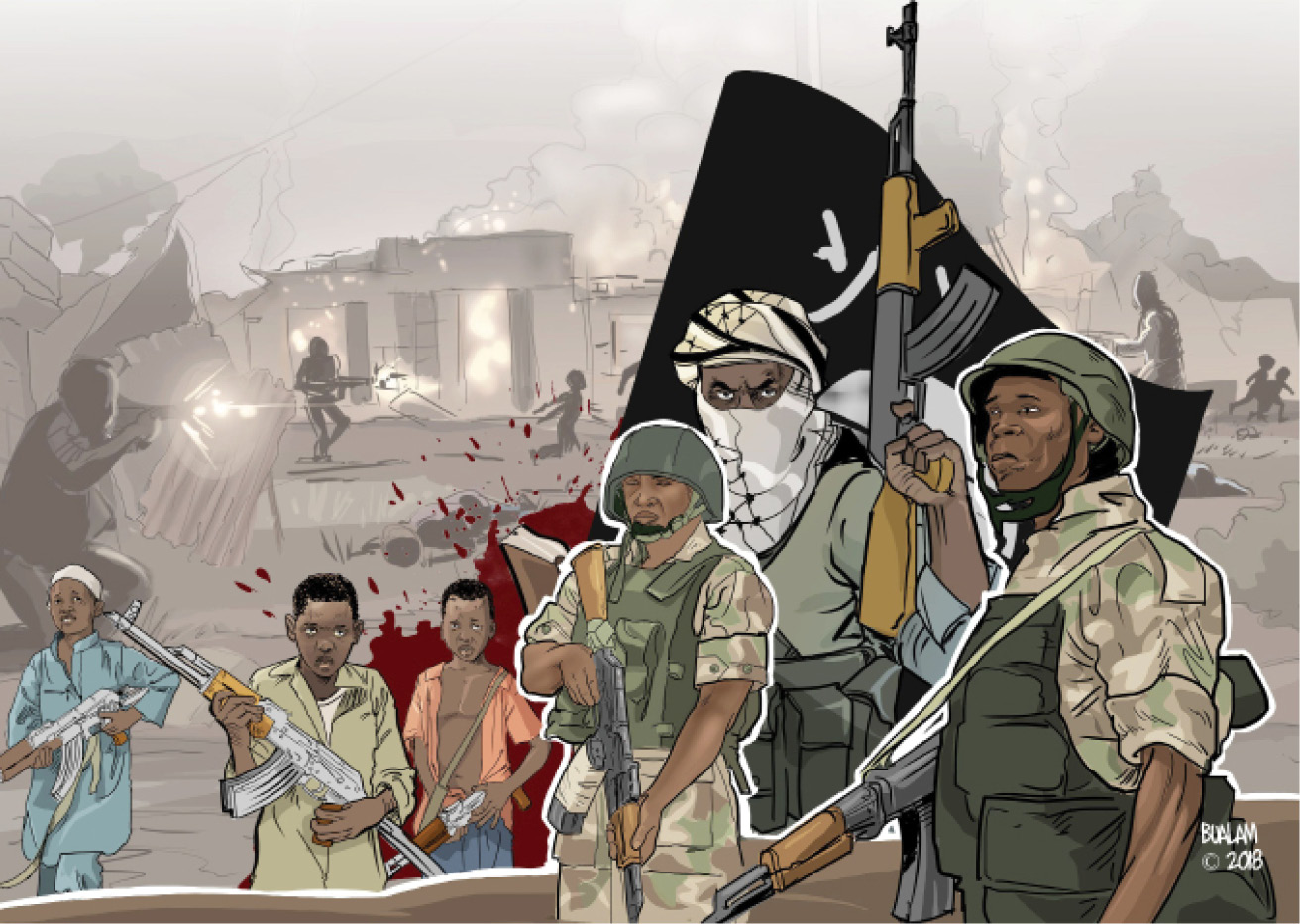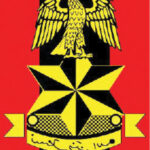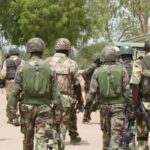On February 4, 2022, no fewer than 25 terrorists, fleeing airstrikes by the Nigerian military, drowned in a deep river located within the Marte axis of the Lake Chad basin in Borno State. On February 10, 2022, a military fighter jet and helicopter gunship eliminated some bandit leaders and terrorists in Niger State. On February 11, 2022, air troops of ‘Operation Thunder Strike’ eliminated no fewer than 20 armed bandits at the general area of the Nigeria Defence Academy (NDA) in Kaduna.
The military has recorded successes like these in recent times, and from my tally, between February 1 and February 13, no few than 155 terrorists, made up of bandits, Boko Haram and Islamic States of West African Province (ISWAP) fighters, have been killed. If on the average, 100 terrorists are killed in every two weeks, that translates to as many as 200 terrorists being killed every month.
- NIGERIA DAILY: How Thugs Dictate The Outcome Of Elections In Nigeria
- Harassment of Ortom threat to unity, co-existence of Nigeria – PDP
In a year, the military would have eliminated as many as 2,400 terrorists, and in over a period of 10 years since the army has been battling Boko Haram, roughly 24,000 terrorists should have been eliminated. This is a significant number. Away from hypothetical figures, it is possible that in reality, the military may have killed more than this estimated number of terrorists since 2009. So, from where do terrorists who throw bombs, slaughter, maim, and kidnap people emerge? Why do they keep increasing like flies, though the military kills them in large numbers? How do they still control territories in Nigeria and some Sahelian states?
In the last decade, government has wasted over seven trillion naira on the security sector, in its design to wipe out terrorists, but they are not yet vanquished. It is evident that those being killed by the military are mainly foot soldiers of terrorist groups, while their masterminds, the live-blood of the organisations, remain actively safe, not necessarily in bunkers, but entrenched in many sectors in the country and beyond, to provide the finance and motivation that attract fresh fighters and procure weapons to keep the battle alive. Who are those that provide the live-blood that energise terrorists? What do they gain from keeping the flame of terrorist attacks alive? Why have they evaded arrest and prosecution by the long arms of the Nigerian law?
To understand the situation, it is necessary to realise that the ultimate goal of Boko Haram and ISWAP is to defeat or extinguish western civilisation in Nigeria and beyond. In order to prosecute this ideology, the masterminds use their political, social and economic networks to raise funds, if necessary, from the western system which they abhor. In the case of Al-Qaeda, before September 11, Osama bin Laden took funds from his investments in Afghanistan and Sudan to sponsor terrorist activities. Investigations have proved that the majority of companies and banks used by Bin Laden were located in Khartoum (Sudan) such as Faisal Islamic Bank, Ladin International, Taba Investment Co. Ltd, Al Themar Al Mubaraka, Al Qudarat, Islamic Bank Al Shama and he used proceeds from them to fund terrorist activities.
Like Al-Qaeda, both Boko Haram and ISWAP could be benefiting from networks of companies and shell companies, shell banks, and offshore trusts to raise money, hide assets, and protect the identities of financial contributors in order to keep them safe. The low-hanging sources of funding for them could be the lucrative fish and cattle industry in the North East, as well as the thriving cross-border smuggling sector, as they have access and even control most of the routes from Nigeria to Chad, Cameroon, up to the Central African Republic (CAR). Another sector to investigate is the narcotic industry, proved to be a fundamental source of funding for terrorist groups. Various reports have proved that terrorist groups in Nigeria abuse narcotic drugs, some heavily intoxicated before they go to battle. Perhaps, drug abuse is just a cosmetic aspect of their engagement with narcotic drugs. There is likely to be a network of international drug trafficking in which some of their masterminds actively operate in order to raise funds to recruit and pay fighters, as well as buy the loyalty of their spies who are spread all over the areas they hold sway.
From research, it has been discovered that illicit drug trafficking had always been the most common criminal activity terrorist groups engage in. Groups like FARC, Basque Fatherland and Liberty (ETA), Kurdistan Workers Party (PKK) and Sendero Luminoso were deeply involved in drug trafficking. So also are terrorist groups who wear the garb of Islam. Then, there is the multibillion naira kidnapping economy, an easy way of generating a lot of dubious funds for terrorist activities. There are also legitimate sources of funding from their members who execute government contracts, or those who trade with them in food items, patronise taxis, buses, and motorcycles owned by terrorist groups and members.
Until November 2020 when the United Arab Emirates (UAE) security arrested and prosecuted six Nigerians for sending funds from Dubai to Boko Haram in Nigeria, there was not enough evidence that the country’s security agencies looked in the direction of the role of illicit funds in financing Boko Haram. Government and the military had given priority to the procurement of weapons to battle terrorist fighters. At another level, government presented terrorists with unsolicited amnesty, and even rehabilitation, which failed to reduce the eagerness of terrorists to fight the Nigerian State. In whispers, terrorist fighters who surrendered to the military or were chased away from terrorist camps have returned with tales of the excess cash available to their commanders to play with. Boko Haram and ISWAP commanders purchase weapons, fuel, vehicle spare parts, food items, clothes, electronics, and even the loyalty of renegade Nigerian fighters with cash. So, one of the ways of advancing this fight against terrorists is not just by killing the poor fighters, many of them conscripted against their will and others forced into battle as slaves, but by cutting off the various streams of funding to the terror groups. And this could be achieved only through diligent, deliberate and forensic financial investigation.
Nigeria must evolve home-grown measures to track illicit funds. Where do all the dollars and naira kidnappers extort from victims enter? Why is it possible for Boko Haram and ISWAP to continue to replenish their stock of weaponry? Why is it possible for terrorists to keep recruiting fighters, including very young ones? What do they do to maintain the loyalty of the fighters? I think these are the posers that should dominate discussions and strategies about how to tackle the intractable insurgency. As government purchases sophisticated weapons from the West, it is important to toe the path of countries who have tracked illicit financial flow to terror groups and successfully cut it off. We could learn from Algeria, Egypt, Saudi Arabia, Israel, US, UK, etc, who have used a combination of technology, diligent but discreet investigations, to cut off the live-wire of terror groups. Unless and until the battle against terrorists deliberately targets those who provide lasting political, logistic and financial support to terrorist networks, the prophetic statement by Lt General Tukur Yusuf Buratai, a former Chief of Army Staff, that Boko Haram would linger as the country’s temptation for another two decades would come to pass.We must take the fight to the unseen forces who pay terrorists to keep fighting.
Abbah wrote from Abuja.

 Join Daily Trust WhatsApp Community For Quick Access To News and Happenings Around You.
Join Daily Trust WhatsApp Community For Quick Access To News and Happenings Around You.


